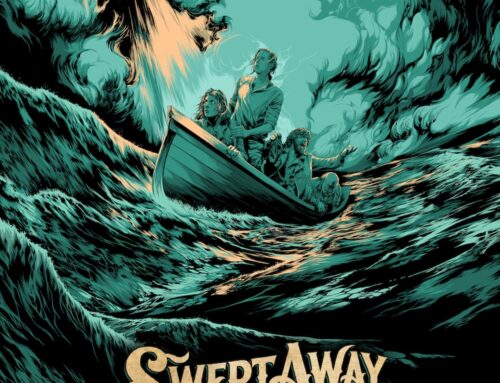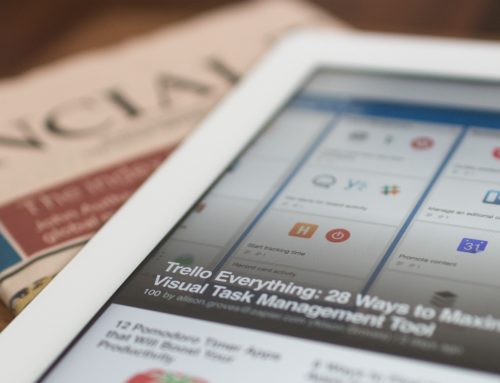When I worked at Ruder Finn some years ago, I was told, one day, that I was being moved to an account that I perceived as less than thrilling.
Never one to hide my feelings very well (I know, weird for a former actress, but it’s true), I must have given away how not-excited I was.
Image: Gisela Giardino via Flickr, CC 2.0
Shortly after, I was marched into the office of one of the VPs (I was an Account Supervisor at the time), for a chat.
Have you read Roald Dahl’s The Witches?
Sugar and spice on the outside but nasty as nails on the inside. Which, of course, witches don’t have.
I was asked a question I will never forget.
“Do you want to remain a tactician or do you want to be a strategist?”
I was so taken aback that I actually gulped.
When I recovered, of course I said “strategist,” because it sounded way more cool and highfalutin than “tactician.”
And I quashed my queasy stomach and started working on the account. Which I found, later, that I really enjoyed… so the Witch did me a huge favor by pulling off the gloves.
That has remained with me to this day.
What I’ve come to realize is, while there is absolutely nothing wrong with being a tactician – and, in fact, I think it’s essential to understand and excel at the tactics of our business – if we want to get anywhere, we need to be able to look at the bigger picture.
Which means becoming a strategist.
I was pleasantly stunned by the reaction to my post the other day on what I perceive as the problem with PR. I don’t rant all that often (publicly… do I?), but this was something I needed to get off my chest.
So I decided to go for it.
The comments are quite extraordinary and, if you haven’t yet, I do hope you’ll take a look and continue the conversation.
What originally sparked the rant, as I mentioned, was the now infamous (to me) Mashable article on “the future of PR and social media.”
When it was published, I had to re-read it several times, rub my eyes, and pinch myself before I could take to my keyboard to type a response – which I typically don’t do with posts on Mashable and its ilk, because how many times do they actually respond?
I won’t repeat what I wrote there.
But it did spur me to ask a few of the folks whose PR acumen I respect – and I stress few, because there are many, many more smart PR people I’m connected to who I either didn’t think to ask in the moment, or didn’t think would respond – what their opinion of the future of PR is.
Here are their responses.
 Mary Deming Barber, APR, Fellow PRSA:
Mary Deming Barber, APR, Fellow PRSA:
We seem to forget that public relations is more than media relations as, in many ways, it’s the easiest to talk about and easiest to understand. However, as a professional, I know much of my time is spent in counseling, community relations or development.
Everyone’s talking about how public relations has changed and is changing. Really? Cutlip and Center in their well-used text, Effective Public Relations, defined public relations as “the management function that establishes and maintains mutually beneficial relationships between an organization and the publics on which its success and failure depends.” That definition still holds true today.
The tools we use for planning, the tactics and the measurement we use might be changing, but I would argue that the basic core principles remain the same.
Most people outside of PR and Corporate Communications only see these professionals through the press release.
In other cases, as you well know, they become the “spin doctors” when required to step up and represent the organization through an approved legal message (i.e. BP). In the end a good public relations professional is almost invisible to the general public, utilizing their talent to promote, support and train effective spokespersons. Their focus on forging relations with the media, traditional and social, uncovers opportunities for win-win scenarios.
The fact that this profession has embraced and continues to innovate using social media to revive the “public” in public relations is refreshing and much needed. The profession continues to move in a positive direction when it comes to measurement, albeit at varying speeds, demonstrating that public relations plays a significant role in corporate reputation, brand recognition and in the best cases, contributing to the bottom line.
The “future for PR and social media:” well, that is easy. The two are made for one another. We have never had an easier way to reach out to the public so directly and immediately. A solid, effective social media program within an organization must, at the very least, incorporate public relations, customer service and marketing. Depending on the organization, and its primary goals, the leader of that group should be one or another group, but public relations is essential in all cases.
A frustrating piece indeed. A tired old theme that I’m tired of countering. News releases don’t equate to media relations let alone PR. It’s a trivializing/marginalizing 1880’s view and it’s a shame to have it perpetuated.
However extensive the author’s research, I have the sense that she asked about the future of press releases, not the future of PR. She also may have positioned her questions to accentuate the role of social media (would make sense for Mashable, no?) … The nosebleed piece is disturbingly narrow, ignoring issues management, reputation, and employee communication, not to mention community relations and CSR.
It doesn’t surprise me, however, anymore than [a commenter’s] view that “fluff, hype and spin” are synonymous with PR.
SB: as you may have seen from Jeff Esposito’s response to my earlier post, Sean’s sense was spot on.
 Kami Watson Huyse, APR:
Kami Watson Huyse, APR:
Social Media is not just changing the tools used by public relations practitioners, but is also helping to change the way that the profession approaches the marketplace.
This is largely because the marketplace is demanding a more human voice, and the smart people in public relations are responding to that expectation. Tools, like the SMPR, Twitter, Facebook and even blogs, are secondary to that goal.
The tools make it possible to truly have a two-way conversation with the marketplace about a product or an idea. Admittedly, this was much harder in the pre-social era.
However, what is said in those exchanges should be judged on their content versus the mere fact that a public relations program or campaign is using a tool. What you do with these tools is the real magic of public relations. And just like in historic eras (some might say prehistoric, though it was only about five years ago), some do this better than others.
The future is the past, true relationships with the community. The return of the ombudsperson continues!
I have to be honest, I have largely withdrawn from debating about PR and what it is and even blogging about it because I feel like it has become a dog chasing its own tail year after year. To me, it’s best to lead by example and move the industry forward by being better.
Although the new PR tools and advanced technology will facilitate great conversations between our brands and their stakeholders, the real value for us as communications professionals is the tremendous opportunity to engage in conversations and to become the people we want to reach.
It’s our ability to be influencers (PR champions who are creators of media) and to educate our brands on how build even better relationships through a new collaborative approach.
As we accept new responsibilities our roles will include working with other areas of marketing, as well as different departments within our companies to guide strategic communication (IT, sales, customer service, HR, Legal, etc.).
We are now required to move outside of our own realm, because social media moves across an organization, to coordinate more closely with other members of the company.
As a result, we need to incorporate the best of our traditional past (great communication skills, relationship building tactics, strong ethics, an emphasis on accountability and measurement, etc.) to grow and excel in our careers as well as to propel our industry forward.
Yes, we’ll experiment with and experience new tools such as Social Media Releases (SMRs) and learn the best ways to engage on new platforms (perhaps it’s Foursquare today but it will be something different tomorrow).
However, our passion to learn, change and grow secures the future of PR, and social media is poised to be a large part of that future.
PR is so much more than the press release, it becomes exhausting trying to defend what we do!
I believe the press release will always evolve and serve its own purpose, and should, given modern communications.
But the press release to the best PR people is a like that last drink at the bar… you really didn’t need it to get the job done.
Smorgasbord
Lots of food for thought here, and I thought Geoff’s and Alan’s comments were particularly of note.
But much as I’d like to stop ranting about stuff like this, what’s apparent to me is that leading by example sometimes isn’t enough.
Otherwise why would a respected trade like PRWeek send out “breaking news” email alerts when a corp. comm. honcho switches jobs? (You may have to log in to read the article.)
Seriously?
“Breaking news”?
I thought that was reserved for, oh, I don’t know, calamitous events such as terrorist attacks, earthquakes, oil spills, tsunamis and the like.
Someone making more money (I’d hope) at a new job is not breaking news, unless it’s Barack Obama.
Walking through the glass
If we are serious about going through the looking glass and not ending up at the bottom of a rabbit’s hole, public relations must get serious about:
better defining what PR really entails and educating the unPR crowd about it
taking measurement seriously, which means starting at the end, i.e. measurable objectives
asking the right questions at the right time, no matter where one hangs on the PR ladder
being business counsel and not nesting where it’s cozy.
Else
we’ll still be having this same conversation decades from now.
What do you think the real future of public relations is? What do we need to do to effect that change?










![[EVENT]: PR Hacks for Small Biz (online)](https://shonaliburke.com/wp-content/uploads/2021/06/FB-Ad-1200x800-01-01-01-Copy-500x383.jpeg)





[…] those who shared them – because they were willing to share them with me. If that’s not relationship building, I don’t know what […]
[…] And no matter how much money I am paid I try, as much as possible, to set myself up for success, rather than failure. I’ve said it before, and I’ll say it again, “PR” is not just about press. […]
[…] to my RSS feed or Subscribe by Email. Thanks for visiting!We’ve talked quite a bit about the need for constantly educating ourselves and our peers recently, haven’t […]
[…] Through the PR Looking Glass | Waxing UnLyrical […]
Wow, this sounds great. Smackdown the bad actors. You going to name names in your post, Gini? ;-)
Great piece Shonali, and great comments by a very well-respected group of true PR professionals. And I don’t say that lightly, since there seem to be few out there who truly understand the role and scope of PR as a profession.
For PR to be a profession, it requires measurement, as you call for. It requires ethical behavior and counsel that affects strategy. It requires a mastery of tactics, as you say, but a broader understanding of how those tactics help achieve larger strategic goals.
So, when people casually discuss PR using tired and hackneyed terminology, we need to do a PR smackdown. We need to educate others about what PR is all about, and that is NOT just publicity, nor is it about “spinning.”
Your blog post is a great piece for practitioners to spread via social media to help educate others. (Yes, social media is a great tool in the hands of a communicator, but it’s just a tool. It’s also a tool in the hands of a marketer, an advertiser, development, human resources, and others. Each use it differently.
Thanks for your great thoughts and the conversation starter!
Thank YOU for stopping by, Robin.
What I find interesting is that a lot of pros will agree with this viewpoint, but then I see them participating in conversations and/or using copy in their posts, newsletters, etc., that do the exact opposite. “Learn how to get buzz!” “Learn how to get free PR!”
Faugh.
Love the idea of a PR smackdown. How do we start?
Robin and Shonali, I’m writing a blog post today that begins the PR smackdown. I am insulted and angry at how some of the people in our industry behave doing, just as you say Shonali, agreeing with the viewpoint and then spinning in the opposite. Real PR pros unite!
Ooh! Can’t wait!
Shonali — no doubt, understanding business to sell and to deliver client service both call on the same skills. Obviously, with you running your own shop you need to excel at both.
At our agency, we’ve found that having senior staff focused on service and not the next sale addresses one of the biggest negative stereotypes about PR agencies. The “senior people pitch me, junior people service me” gripe on the part of clients.
[…] by Email. Thanks for visiting!I’ve ranted quite a bit about the problem with PR, what the real future of PR is, and why good PR measurement is so […]
Good comments. Just to clarify, when I said business understanding I’m not talking about biz dev, I’m talking about knowing your client’s business intimately to better deliver service.
We’ve had a lot of success separating those functions at Strategic. I don’t spend my time worrying about finding the next client, I focus on our existing ones.
Chris, totally agree that it’s about business acumen (biz dev is something entirely different). Some companies do a great job of teaching their employees about financials and holding everyone accountable to the bottom line. Most do not.
Chris, yes I agree re: the difference between business development and acumen.
I do think both take an understanding of research and strategy. Those are important for creating effective campaigns for clients, and they’re important when creating proposals as well. They are implemented differently, but I think the mindset has to be focused on business objectives, i.e. how can we achieve “x” for the client or potential client, in both cases. For current clients, it’s why they hired us. For potential clients, it’s why they will (or won’t) hire us.
Business development also includes a large sales component and I think it’s smart to keep smart business strategists who aren’t comfortable with the sales aspect out of it, and let them focus on what they do best. I think that’s a major failing at many agencies; a percentage of the business you might bring in as a carrot, but no one teaches the employees, especially more junior ones, how to do that.
Hi Shonali!
I agree with much of what has been written here, including Chris’s comment.
A couple of things I would add:
1. To Chris’s point, PR people need to demonstrate business acumen in order to properly counsel clients. I worked for Fleishman-Hillard and we were told to understand the client’s business all the time, but no one taught us what that really meant. It wasn’t until I started my own business, and we began to do our own PR, did I realize a) what that meant and b) how what we do CAN affect revenue…not just impressions. I think if we truly want a seat at the proverbial table, we should take some financial, P&L, and business management courses.
2. Analytics, analytics, analytics. If we think impressions, ad equivalences, share-of-voice, or number of followers are enough, we’re much too tactical and will never get to the executive suite. The thing I love about digital communication is we can measure EVERYTHING. All PR pros need to figure out analytics and be able to demonstrate how their work is affecting sales. Period.
Gini, thanks so much for stopping by.
You raise a really interesting point about business acumen. I remember, when I was in the agency world, how “business development” was always something we lesser mortals were told to do by the higher-ups. But there was absolutely no training on what that meant, how to research and respond to an RFP … it was only when an EVP at RF took me under her wing and showed me – literally – how she went about researching and writing proposals, that I started to get it.
Over recent years, I have developed my own style and “think” my proposals are good (so I’m told, and when I win business, I know they are). But that’s a(nother) huge educational gap agencies need to fill.
Yes, Shonali! Add a third bullet to my list: Learning how to network and develop business. You’re absolutely right that they tell you you have to do it, but no one teaches you how. I remember sitting in a meeting with the author of “Win Friends and Influence Others” and, while it was really interesting, I walked out of there still having no idea what I was supposed to do. I didn’t figure it out until I had to do it for Arment Dietrich.
Amen Shonali. A few thoughts:
1. I feel like engaging in actual tactical work helps me be a better leader of my client teams. Can’t be perceived as above getting my hands dirty, and I feel a manager needs to know how to do something he or she is managing from others. Sounds so obvious but often not so in corp. America.
2. PR people need to demonstrate the business knowledge to truly be consultants to our clients, not order takers. PR is a commoditized service with little differentiation besides individual excellence. Some in the industry do mediocre work, then whine they are not invited to the meetings in which the big client decisions are made.
3. This industry (and the media in general) are second to none when it comes to inside baseball, self-absorbed navel gazing.
Chris, I couldn’t agree more about the tactical work. Where I think we need to hit “pause” is if that’s all we’re focused on, because then we’ll never see the proverbial bigger picture. Er, just how big is it?
Re: navel gazing… my vote’s with the media on that one!